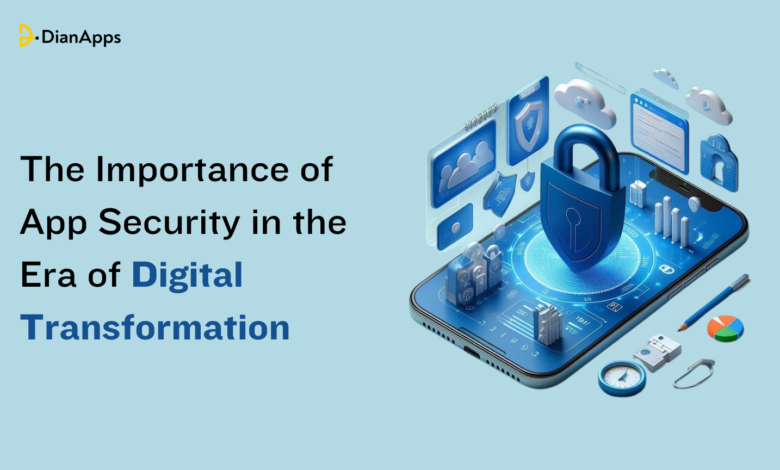The Importance of App Security in the Era of Digital Transformation
Businesses from each industry are continuously evolving with digital transformation, app security always remains the primary concern for business strategy.

Whether you own an e-commerce, finance, e-learning, real estate, or other business. All of them undergo certain digital transformations over a significant period. Every technical innovation comes with certain benefits and challenges, and the major challenge is data security.
The business model transitions from a traditional model to a more agile and digitally driven system. Always remember that more data leads to more data security concerns. This shift manipulates businesses to adopt the latest models and overcome the most economic challenges.
Every business aims to adopt a technology that ensures the protection of data stored in a cloud or mobile environment. Digital transformation becomes useless if sensitive data is compromised. Furthermore, advancements in computer technology led to a transformation in business operations. Similarly, a digital transformation ensures long-term growth by improving the customer experience.
With increased security, most users ask, why is application security important in software development? Additionally, they also want to know about the role of cybersecurity in digital transformation. This blog has covered all the major aspects required by users to adopt the latest digital innovations.
Types of Security Threats
Every business comes across different types of security threats. Here, you will come to know about the most crucial types of security threats are:
- Data Breaches: Inadequate access to security threats, results in app vulnerabilities or its backend systems.
- Malware Attacks: Various malware websites are designed to scrap the data of businesses using unauthorized access.
- Man-in-the-Middle (MitM) Attacks: Major data thefts or manipulation are processed from inception and alteration of communication between the mobile app and its backend services.
- Unauthorized Access: Obtaining the smartphone application or its content without the required authorization, frequently by avoiding security measures or taking advantage of inadequate authentication methods.
What is the Role of CyberSecurity in Digital Transformation?
Cybersecurity is a critical factor for businesses improving with digital transformations. As businesses are continually adopting new technologies, the need for security measures has also increased. Here are the major roles of cybersecurity in ensuring that digital transformation is highly successful and secured.
Protecting Sensitive Data
Whenever we visit a website, we see a pop-up for the sign-in process. In this digital age, businesses collect, share, and store a vast amount of user’s sensitive data, including financial details, intellectual property, and personal information. Cybersecurity ensures the protection of this valuable information from being accessed by unauthorized parties, ensuring that the information provided by users remains confidential.
Building Customer Trust
One of the major challenges faced by businesses due to data breaches is the loss of customer trust. If an app fails to protect the confidential information of the users, they may abandon and move to a competitor. Implementation of cybersecurity measures ensures to protect the user data, which in turn builds trust and loyalty.
Compliance with Regulations
To protect data security measures across the globe, regulatory bodies have implemented some strict laws such as CCPA (California Consumer Privacy Act) in the United States and GDPR (General Data Protection Regulation) in the European Union. Companies that fail to implement these regulations may have to bear heavy fines and legal penalties. Cybersecurity ensures compliance with these laws by protecting data and providing transparent data handling practices.
Ensuring Business Continuity
Digital transformations are of various types, such as it involve the integration of applications, platforms, and new systems. So, if any of these systems suffer from a cyberattack, it can halt business operations and disrupt service delivery. This is where cybersecurity measures play an important role in preparing an organization for potential security threats, maintaining business continuity, and minimizing downtime.
Mitigating Risks from Emerging Technologies
Integration of new technologies like blockchain, IoT, and AI into mobile applications gives rise to various new vulnerabilities. Cybersecurity plays an important role in identifying these risks before any operation is hampered. It ensures that businesses take full advantage of innovative technologies without exposing themselves to security threats.
Importance of Data Privacy and Security in Mobile Apps
Technological advancement has increased the relevance of mobile apps for individuals and businesses. From e-commerce businesses to finance services all the users store and share their personal information through mobile apps daily. Due to this data privacy has become the top of the concern of the businesses that want such applications. Let’s look at some of the important reasons for the app security and privacy matters:
Protection of Personal Data
While accessing mobile apps they necessarily collect personal information such as phone numbers, payment information, biometric data, names, and addresses. So, the data provided by users needs to be protected to maintain user privacy security.
Financial Implications of Data Breaches
Data breaches can become a serious financial concern for businesses. If an application lacks data security, it can lead to significant lawsuits, compensation claims, and fines from the affected users. A prominent hotel chain in 2018 was fined over $100 million for failing to secure customer data. To maintain the financial stability of the business, it is important to protect your business from such security breaches.
User Trust and Retention
In an era where cyber crimes are increasing, people are becoming more aware of sharing their personal information with apps. Looking at this, apps have started adopting data security measures, to foster trust and encourage users to continue using their services. On the other hand, apps with low-security measures are more likely to experience higher churn rates.
Compliance with Global Regulations
Today, most of companies adopt data security measures like CCPA and GDPR to protect user’s data. Failure to do so can lead to high penalties and legal consequences. Whenever you develop a mobile application, ensure that all these security regulations are kept in mind to void non-compliance.
Prevention of Unauthorized Access
Today with an increase in the number of cyberattacks, mobile apps are the prime target of hackers to access sensitive data. Businesses can prevent unauthorized access, by implementing strong authentication methods such as biometrics, or two-factor authentication.
Best Practices for Achieving Mobile App Security
App security is one of the most important factors that needs to be achieved for enhanced user experience. Here, you will come to know about the best practices for achieving mobile app security. Secured coding practices are one of the most important practices to prevent code obfuscation and injection attacks.
Use Strong Authentication Methods
Make sure that only authorized users can access the mobile app, this can only become possible with implementing multi-factor authentication (MFA). This ensures the reduction of unauthorized access to sensitive information.
Encrypt Sensitive Data
Using advanced encryption algorithms, ensures to incorporation of sensitive data systems into businesses to protect against data breaches.
Secure APIs
With proper authentication and encryption, use a secure API system, and implement rate-limiting to prevent attacks and abuse like cross-site scripting or SQL injection.
Regularly Update and Patch the App
After an app is launched, ensure to access all vulnerabilities and update the app regularly to ensure data security loopholes are fixed on time. This ensures the app stays secure against evolving threats.
Use Secure Coding Practices
Follow secure coding guidelines and frameworks to minimize vulnerabilities during development, such as avoiding hardcoded credentials and ensuring proper input validation.
Implement Secure Session Management
Use secure session handling techniques like token expiration and automatic session termination to minimize the risk of session hijacking.
Conduct Regular Security Audits and Penetration Testing
Regularly perform security audits and penetration testing to identify potential vulnerabilities and strengthen the app’s defense mechanisms.
Educate Users on Security Practices
Provide users with information on strong password practices and how to identify phishing or suspicious activities to prevent social engineering attacks.
List of Frameworks that Ensure App Security
This section will provide you with a list of mobile app development frameworks that are highly secure and user-friendly. Development of an application using these frameworks has less chance of being caught with cyber crimes.
React Native
React Native provides built-in security features such as secure storage options (like AsyncStorage and SecureStorage) and the ability to use libraries for encryption and authentication. Developers can also apply platform-specific security measures for iOS and Android.
Flutter
Flutter offers secure solutions through packages such as flutter_secure_storage for sensitive data storage and allows the implementation of encryption and keychain features for both iOS and Android. It also supports secure network communication by integrating SSL pinning for securing API calls.
Ionic Framework
Ionic is built with Angular, which supports web security features and allows seamless integration with Cordova plugins for secure mobile app development. It has libraries for secure storage, authentication, and encryption techniques, ensuring secure data transmission.
Xamarin
Xamarin allows the development of secure mobile apps by providing features like secure storage, encryption support, and built-in APIs for authentication. Xamarin integrates with secure storage mechanisms on both iOS (Keychain) and Android (Keystore) platforms for sensitive data storage.
Apache Cordova
Apache Cordova allows developers to use native device features, including secure data storage via the Cordova Secure Storage plugin. It also supports strong encryption and authentication practices through plugins that ensure secure communication between the app and external servers.
Swift (for iOS apps)
Swift, Apple’s programming language for iOS app development, includes robust security features such as Keychain services, Secure Enclaves, and strong encryption protocols. It allows secure storage, authentication, and data protection capabilities, ensuring user data remains safe.
Kotlin (for Android apps)
Kotlin offers built-in security features for Android apps like EncryptedSharedPreferences and the Android Keystore system. It also supports integration with third-party libraries for added security measures such as encryption, secure network communication, and biometrics.
Final Words
Businesses from each industry are continuously evolving with digital transformation, app security always remains the primary concern for business strategy. Cybersecurity is not just related to preventing attack, but it also ensures to build a secure ecosystem where businesses and users can interact confidently and safely. Increasing number of cyber threats, leverages the need for businesses to implement robust security measures, and adopt best practices for mobile app development.
Inefficient data security issues can lead to various challenges including data breaches and financial losses for an organization. By leveraging the right technology and mobile app development company, businesses can reduce these risks and ensure that their apps remain compliant, trustworthy, and secure.
As the digital landscape enhances, so will the threats. However, with the right approach to data security, businesses can continue to innovate while safeguarding their users’ data and maintaining trust in their digital services.











